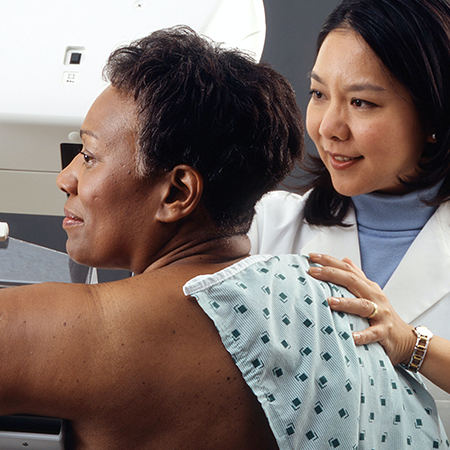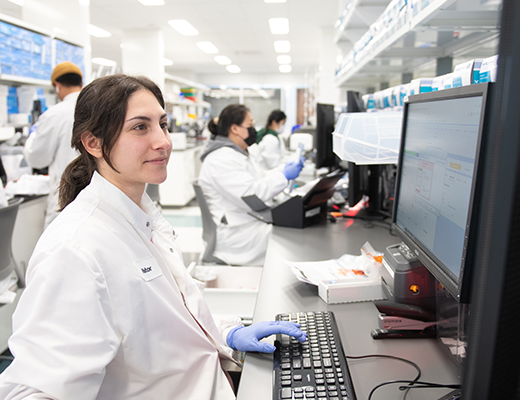
Exceptional prognostic testing for breast cancer
The Prosigna® Breast Cancer Assay is a prognostic test that helps inform treatment decisions for patients with early-stage breast cancer.
- Screening
- Diagnosis
- Prognosis/treatment selection
- Recurrence monitoring
Prosigna
IMPROVING CARE FOR BREAST CANCER
The Prosigna test provides data for personalized treatment

The Prosigna Breast Cancer Assay is a genomic test that is designed to help physicians and their breast cancer patients make more informed and confident treatment decisions. The test is indicated for post-menopausal patients with early-stage breast cancer that is hormone-receptor positive (HR+) and HER-2 receptor negative (HER2-). The Prosigna test uniquely assesses the activity of a 50-gene signature known as PAM50, which is based on the four key breast cancer molecular subtypes. It then combines this genomic analysis with clinical information to provide an accurate, reliable risk-of-recurrence (ROR) score and risk category. The ROR score indicates the potential that a patient’s cancer will recur within the next 10 years if they receive only anti-hormonal therapy.
The Prosigna test provides more comprehensive information than traditional testing approaches and has shown improved prognostic performance compared to older genomic tests.1 The Prosigna test is included in leading international clinical guidelines.2-7

WHEN THE TEST IS USED
Assess recurrence risk after early-stage breast cancer diagnosis
The Prosigna test is used following breast cancer surgery to help physicians and their patients make decisions about chemotherapy. Patients with a high test score may need a more aggressive treatment plan that includes both hormone therapy and chemotherapy. Those with a lower score may receive hormone therapy alone, potentially avoiding chemotherapy and its side effects.

LOW RISK
May potentially avoid treatment intensification (per guidelines)
INTERMEDIATE RISK
May need treatment intensification or further testing (per guidelines)
HIGH RISK
May need treatment intensification (per guidelines)
Serving patients across the US and globally
The Prosigna test is offered as an in vitro diagnostic (IVD) test that laboratories perform on the nCounter® Analysis System. The test is FDA 510(k) cleared in the United States (US). It is also CE-IVD marked and available for use by clinicians in the European Union (EU) and other countries that recognize the CE mark. The test is widely reimbursed by government and other payers.




Learn about the Prosigna test for breast cancer
REFERENCES
Alexandre M. et al. Cancer Manag Res. 2019.
Gradishar WJ, Moran MS, Abraham J, et al. NCCN Guidelines® Insights: Breast Cancer, Version 4.2023: Featured Updates to the NCCN Guidelines. J Natl Compr Canc Netw. 2023;21(6):594-608. doi:10.6004/jnccn.2023.0031
Andre F, et al. Journal of Clinical Oncology. 2022.
Cardoso F, et al. Ann Oncol. 2019.
Coates AS, et al. Ann Oncol. 2015
Curigliano G, et al. Ann Oncol. 2017
Tumour profiling tests to guide adjuvant chemotherapy decisions in early breast cancer. National Institute for Health and Care Excellence. Accessed July 26, 2023. https://www.nice.org.uk/guidance/dg34
Dowsett M. et al. Journal of Clinical Oncology. 2013.
Gnant M. et al. Annals of Oncology. 2014.
Lænkholm A-V. et al. Journal of Clinical Oncology. 2018.
The Prosigna Breast Cancer Assay is FDA-cleared and CE-marked. For availability in individual EU countries and other territories outside of the US, please check with your local representative or distributor.
This website contains information on products that are targeted to a wide range of audiences and could contain product details or information otherwise not accessible or valid in your country. Please be aware that we do not take any responsibility for you accessing such information that may not comply with any legal process, regulation, registration or usage in the country of your origin.








